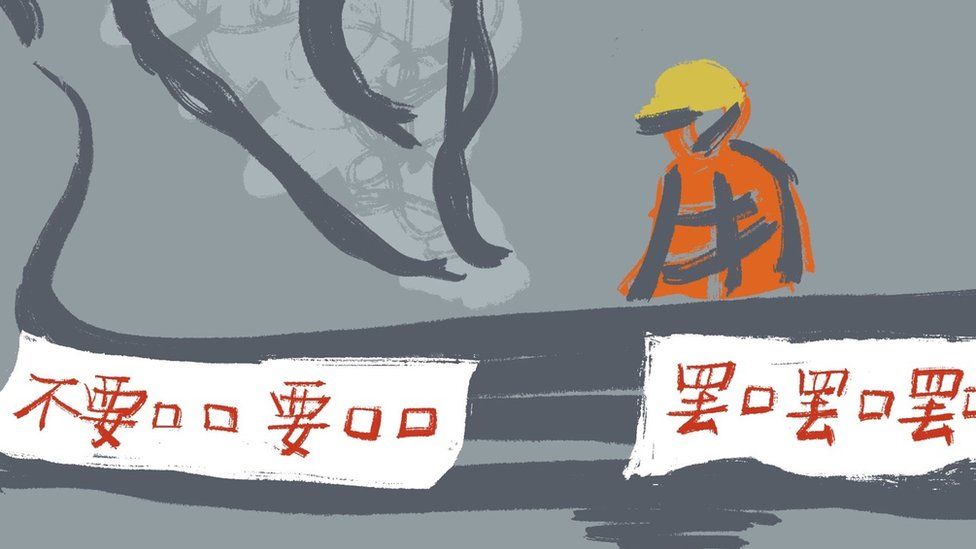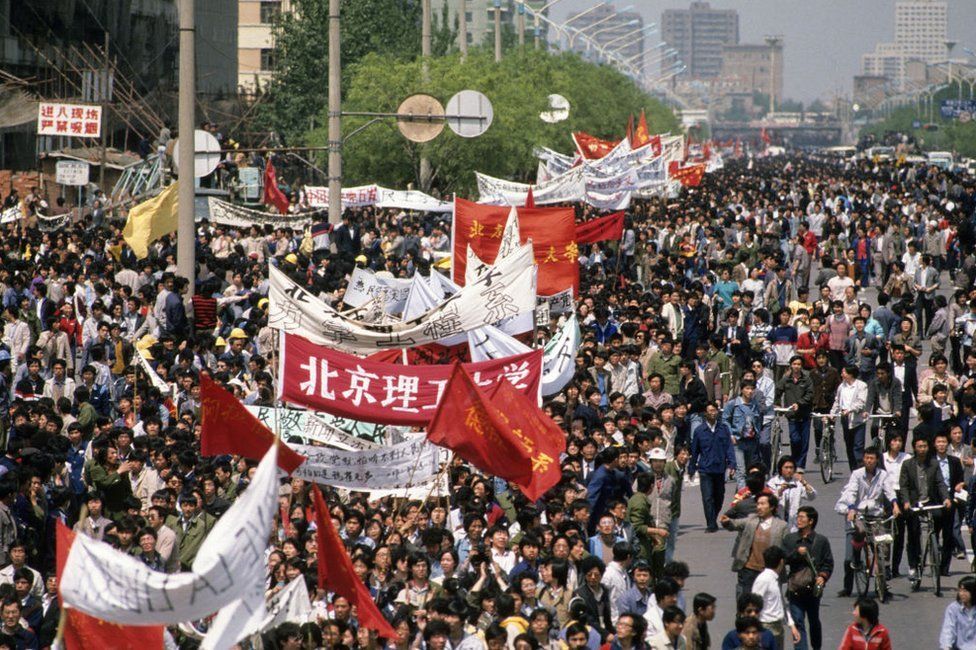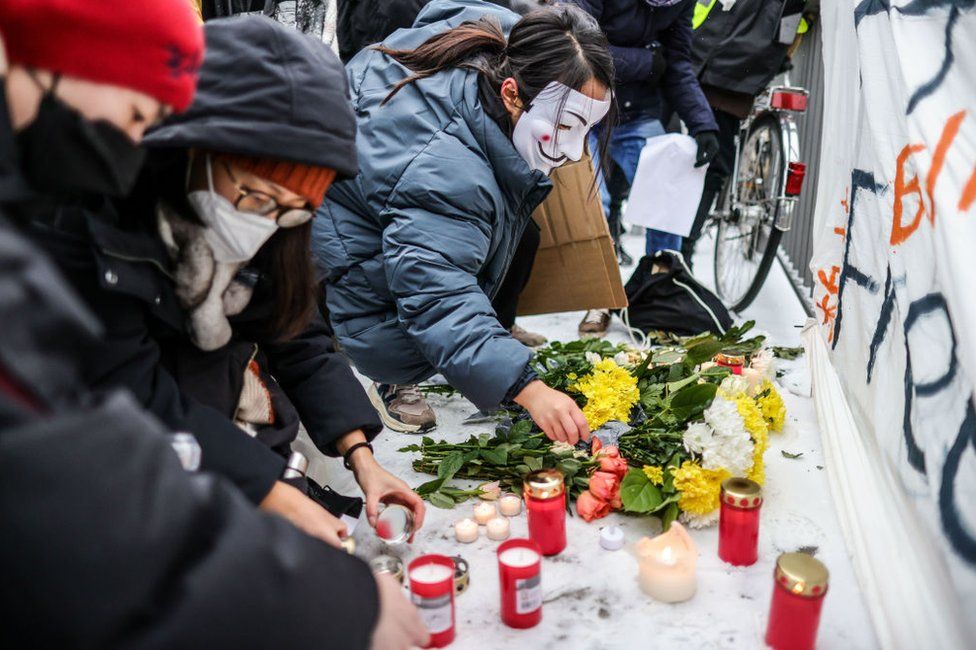Huang Yicheng was scrolling through his social media feeds after a long day’s work on 26 November 2022 when videos of crowds gathering along Shanghai’s Urumqi Road caught his eye.
Holding candles they mourned the victims of a recent apartment fire in the north-western city of Urumqi. Many believe they couldn’t escape due to strict Covid-19 restrictions, but Chinese authorities dispute this. The protesters also held up blank white sheets, which they said symbolised “everything we want to say but cannot say”.
The vigil in Shanghai quickly turned into a rare protest as people began shouting for China’s leader Xi Jinping to step down.
“I felt so inspired and riled up,” said the 27-year-old. The next day he joined the protesters when they gathered at the same spot, after being driven away by the police the night before.
Similar “White Paper” protests erupted across China. Thousands took to the streets in the capital Beijing, in Chengdu in the south-west, in Xi’an at the centre of the country, in Wuhan, which recorded the world’s first Covid cases.
One year on, those who took part in the protests, which hastened the end of China’s harsh zero-Covid rules, are living between hope and fear.
The BBC spoke to four protesters who say they had hoped for a bigger political awakening. But, as the crackdown unfolded, they left the country – and some continue to keep a low profile, fearing for the safety of their families and friends back home.

“I was planning on going abroad but I never expected to have to stay here for the long term,” says Yicheng, who is now in Germany. “Participating in the White Paper protests has completely changed my life’s trajectory.”
He – along with other protesters – was arrested by Shanghai police as they tried to break up the demonstration. He says they dragged him upside down and then shoved him onto a bus. When they were preoccupied with a fellow protester, Yicheng seized the chance to escape.
But he lived in great fear for several months after that. He was scared authorities would show up at his door and whisk him away. He cut up his Sim card, quit his job, and moved to a remote, mountainous area in Yunnan. He told a trusted friend that if he texted them a smiling emoji, it would mean that he had been detained.
In March, he fled to Germany on a student visa, after a brief return home. To evade authorities, he took a convoluted journey to Shenzhen, where he crossed into Hong Kong by road. He then flew to Singapore and took a final flight to Hamburg. He is now applying for asylum in Germany.
“I think there was a political awakening – and it continues brewing among young people in China,” Yicheng says. “But the price for political activism in China is too high. The authorities have so much power, it is frightening.”
He believes the White Paper movement was part of a series of events that saw a resurgence of critical voices in China in recent years – despite Mr Xi’s increasingly stifling rule.

He referred to the dramatic protest in Beijing in October 2022, when a mysterious man draped two large banners on Sitong bridge calling for an end to zero-Covid and the overthrow of Mr Xi. There were reports of an arrest but, to this day, there has been no official confirmation and the identity of the protester remains unknown.
Angry and tired of crushing Covid lockdowns even as the economy sputtered, residents clashed with authorities in various places, from Shanghai to Guangzhou to Zhengzhou. The frustration soon morphed into something more towards the end of November when, over five days, people took to the streets across China in numbers not seen for decades – and in a rare show of dissent against the ruling Chinese Communist Party.
Chinese people living abroad – in Japan, the EU and the US – organised similar protests. In China the crackdown was swift – police used pepper spray to break up the crowds, and on-the-spot detentions and heavily policed streets kept them from regrouping.
Beijing’s extensive surveillance led to more arrests in the weeks and months after, but quietly – the actual number of those who were detained, or still remain held, remains unknown.
“Information around the White Paper protests and other similar movements quickly falls into a black hole in China,” Yicheng says. “We do see more critical voices online now, but the state’s censors swiftly kick into action. They simply silence what they don’t like to hear or read.”
Zhang Junjie, who held up a blank sheet at his university in Beijing on 27 November last year, says he never could have imagined the events that followed the “simple act”.
He was asked to leave school – he says university authorities told his father, who brought him home, that Junjie had developed a “sudden mental illness”.
Junjie’s father scolded him and then sent him to a psychiatric hospital, where he was diagnosed with schizophrenia, Junjie said. He says he was admitted to hospital several times in the next three months – and doctors gave him tranquilisers during that time.
“Even my grandfather questioned why I had become so ill that I was opposing the Chinese Communist Party. I didn’t expect my family to co-operate with the authorities to such an extent,” he said.
When Junjie returned home, he continued to disagree with his family on his decision to participate in the protests.
He eventually dropped out of university in Beijing and in August this year, he left for New Zealand – he says he wanted to study abroad, but he also wanted to flee “persecution”. He says he too wants to seek political asylum.
But Junije hasn’t been able to shake off his disappointment over the lack of freedom back home: “Sometimes I feel so hopeless. Democracy in China feels like a distant dream.”

The White Paper protests drew inevitable comparisons with the student-led Tiananmen Square protests in 1989, where tens of thousands gathered calling for greater freedom and democracy. It had been set off by the death of the reformist leader Hu Yaobang – and it ended with a bloody military crackdown that killed hundreds or, by some estimates, thousands.
The Tiananmen protests soon turned into a taboo, with no evidence of the movement in Chinese official narratives or even the country’s internet. The White Paper movement has met a similar fate, with records of it scrubbed online, which some say indicates the sophistication of Beijing’s censors.
This November, there were several events held outside China to mark the anniversary of the protests, but none in the country. The BBC understands that in early November authorities had warned those who took part in last year’s protests not to get involved this year.
A student in his 20s, who did not want to reveal his name, recalls how excited he felt gathering with other protesters in Chengdu on 27 November last year. “Being at the scene and hearing people chant slogans so boldly. I really felt at the moment that there could be real change in China.”
Now, a year on, he says discussions about the protests have disappeared: “Perhaps people don’t feel safe talking about it.”
But he said he had been struck by how much the White Paper protests reverberated across the world: “This was something I realised only after I left China.”
He has been in France since May this year. He left China after three rounds of questioning by the police. He says he is still worried about causing trouble for his friends and family.
“I don’t want to come to a point where I am completely cut off from China, or to be perceived as a very ‘political’ person,” he said.
For a 20-something Shanghai protester, who also wished to remain anonymous, last year’s protests led to the opposite decision.
He used to aspire to work in a large private company, but is now leaning towards advocacy. He is now enrolled as a student in London and wants to continue speaking up for Chinese people.

“The White Paper movement changed me,” he said.
The demonstrations were spurred by Beijing’s decision to cling to zero-Covid rules even as the rest of the world opened up. But, he said, protesters had rallied around something bigger – their opposition to the country’s leadership.
The White Paper movement inspired “a fair bit of soul-searching” among young, educated Chinese, says Maya Wang, interim China editor at Human Rights Watch.
She points to Halloween revellers this year showing up to parties with blank sheets of paper stuck to their clothes, and she says China’s sluggish economy has led to more people “rethinking their lives”.
“It is hard to say how optimistic one should be about the space for dissent in China. But we do see a larger number of people – and capital – leaving China, which is an interesting change from the last decade of carefully-cultivated nationalism.”
But Beijing’s “heavy-handed approach was intended to have an intimidating effect and it did,” says Steve Tsang, who heads the China Institute at the School of Oriental and African Studies in London.
Nevertheless, he said, the White Paper protests show that “the human spirit lives on in China”.
“As Mao Zedong famously said, a spark is all that is needed to set the prairie on fire. Mr Xi only needs to falter once… To stay in power he has to be successful every time.”














11 comments
You really make it seem so easy with your presentation but I find this topic to be really something that I think I would never understand. It seems too complex and extremely broad for me. I am looking forward for your next post, I’ll try to get the hang of it!
Hi! This is my 1st comment here so I just wanted to give a quick shout out and say I really enjoy reading your posts. Can you suggest any other blogs/websites/forums that cover the same subjects? Thanks a ton!
There is obviously a bundle to know about this. I believe you made various good points in features also.
20 minutes to go at the Rajamangala Stadium and Liverpool are yet to reduce the deficit against a young Manchester United side in this second half. Manchester United tonight fly out to Dublin for their final pre-season game, against Athletic Club at 4pm on Sunday. Liverpool have brought in Uruguay striker Darwin Nunez in a club record £85 million deal from Benfica this summer and tied Mohamed Salah to a new contract but lost Sadio Mane to Bayern Munich. Henderson admits Mane’s departure is a “big blow” but believes they have the attacking options in Salah, Nunez, Luis Diaz, Roberto Firmino and Diogo Jota to compensate for the loss of the Senegal forward. APPADS You can email the site owner to let them know you were blocked. Please include what you were doing when this page came up and the Cloudflare Ray ID found at the bottom of this page.
https://wiki-byte.win/index.php?title=Flash_livescore_cz
A record 15 players from Alabama high schools and colleges in 2023 made the annual poll of NFL players to pick the league’s best. Paradise, NV Show game type: Regular season | Playoff Lowest-scoring game total: 3 (November 26, 2007: Steelers 3 vs. Dolphins 0) A record 15 players from Alabama high schools and colleges in 2023 made the annual poll of NFL players to pick the league’s best. рџЏ€ Ranking the top 25 college football teams Fans today would assume the current version of the league, which is so heavily geared towards offense, would be the era in which the highest-scoring game in NFL history occurred. But those football aficionados would be wrong. The highest score in NFL history came nearly 56 years ago in a wild offensive explosion when Washington’s Hall-of-Fame quarterback Sonny Jurgenson beat up the New York Giants 72-41. The matchup set the all-time single-game NFL scoring bar at 113 points.
Enjoyed looking at this, very good stuff, thanks.
Outstanding post but I was wondering if you could write a litte more on this topic? I’d be very grateful if you could elaborate a little bit more. Many thanks!
I enjoy your writing style truly loving this internet site.
Very fantastic information can be found on blog.
Thanks on your marvelous posting! I seriously enjoyed reading it, you might be a great author.I will make certain to bookmark your blog and will eventually come back at some point. I want to encourage one to continue your great work, have a nice holiday weekend!
I do agree with all the ideas you’ve presented in your post. They’re really convincing and will definitely work. Still, the posts are very short for starters. Could you please extend them a little from next time? Thanks for the post.
We stumbled over here coming from a different web page and thought I might check things out. I like what I see so now i am following you. Look forward to looking over your web page yet again.